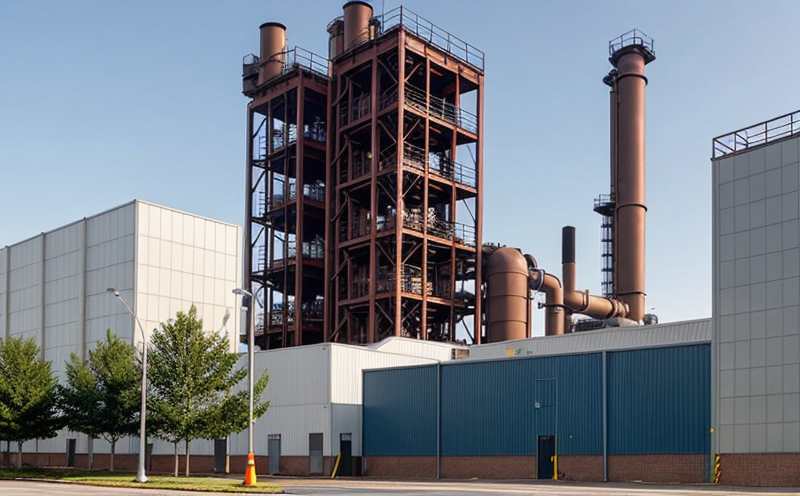ISO 19011 Auditing of Management Systems in Industrial Facilities
The ISO 19011 auditing standard is designed to ensure that management systems are effectively implemented and maintained, thereby enhancing the performance and effectiveness of industrial facilities. This service focuses on the application of ISO 19011 within industrial manufacturing settings, where quality assurance and compliance with international standards are critical for operational excellence.
Industrial facilities operate under a variety of pressures, from regulatory requirements to environmental considerations, all while striving for continuous improvement in efficiency and productivity. By implementing an effective management system aligned with ISO 19011 principles, industrial organizations can ensure that their processes meet the highest standards of quality, safety, and sustainability.
ISO 19011 provides guidelines for audits conducted by internal or external auditors to assess compliance with relevant international standards. This service ensures that management systems are robustly evaluated based on a structured audit process. The audit focuses not only on adherence to standards but also on the effectiveness of the system in achieving organizational goals.
For industrial facilities, this means conducting audits that cover all aspects of quality assurance, environmental impact assessment, and safety protocols. By leveraging ISO 19011 principles, organizations can identify areas for improvement, enhance compliance, and ultimately achieve a higher level of operational excellence.
The audit process involves several key steps: preparation, planning the audit, conducting the audit, reporting findings, and follow-up actions. Each step is meticulously designed to ensure that all aspects of the management system are thoroughly evaluated. The preparation phase involves understanding the organization's context, risks, and opportunities. Planning the audit ensures that resources are allocated efficiently for a comprehensive review.
During the audit process, internal or external auditors will gather evidence through interviews, document reviews, and site visits to assess compliance with ISO 19011 requirements. The findings of these audits are then documented in a report, which serves as a basis for corrective actions. Follow-up actions ensure that identified issues are addressed promptly, leading to continuous improvement.
The implementation of ISO 19011 auditing is particularly beneficial in industrial manufacturing and processing environments where the stakes are high. For instance, in facilities producing critical components or handling hazardous materials, even minor deviations from established protocols can have significant consequences. By adhering to this standard, organizations can minimize risks, enhance operational efficiency, and ensure that their management systems remain robust and adaptable.
ISO 19011 auditing helps industrial organizations maintain a competitive edge by ensuring they are compliant with the latest standards and best practices. This service is crucial for maintaining industry reputation, meeting regulatory requirements, and fostering a culture of excellence within the facility.
Applied Standards
| Standard | Description |
|---|---|
| ISO 19011:2018 | This standard provides guidelines for the implementation of management systems audits. It is applicable to both internal and external audits conducted by qualified auditors. |
| ISO 9001:2015 | Absolutely integral for quality management within industrial facilities, this standard ensures that processes are consistently meeting customer expectations. |
| ISO 14001:2015 | This standard focuses on environmental management and helps organizations reduce their negative impact on the environment. |
| OHSAS 18001:2007 (now ISO 45001) | Guides organizations in managing occupational health and safety risks, ensuring a safe working environment. |
Industry Applications
- Quality assurance in manufacturing processes.
- Environmental compliance audits to meet regulatory requirements.
- Risk management for industrial operations involving hazardous materials.
- Continuous improvement initiatives aimed at enhancing operational efficiency.
- Safety audits of industrial facilities to identify and mitigate risks.
The application of ISO 19011 auditing in these areas ensures that industrial facilities are not only compliant with international standards but also operate efficiently, sustainably, and safely. This service is particularly valuable for organizations seeking to enhance their reputation through consistent adherence to best practices and regulatory requirements.
Competitive Advantage and Market Impact
- Enhanced Compliance: Ensures that industrial facilities meet all relevant international standards, which is a key differentiator in highly regulated industries.
- Improved Efficiency: By identifying inefficiencies and areas for improvement, ISO 19011 audits contribute to operational excellence.
- Risk Mitigation: Audits help identify potential risks early on, allowing facilities to take proactive measures to prevent costly accidents or environmental incidents.
- Customer Satisfaction: Consistent adherence to quality standards ensures that products meet customer expectations, leading to higher satisfaction levels.
- Market Reputation: Demonstrating compliance with international standards can enhance a facility's reputation and attract more customers.
The implementation of ISO 19011 auditing provides industrial facilities with a competitive edge by ensuring they are at the forefront of industry best practices. This service is crucial for maintaining a strong market position in an increasingly globalized and regulated environment.





